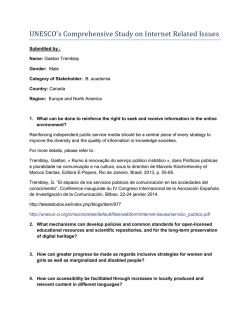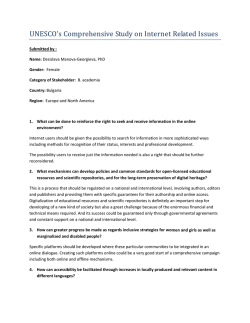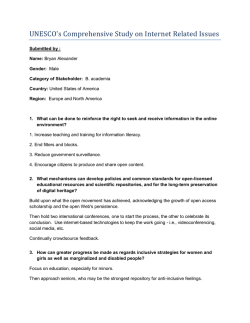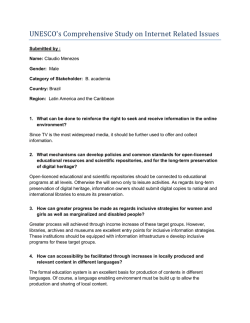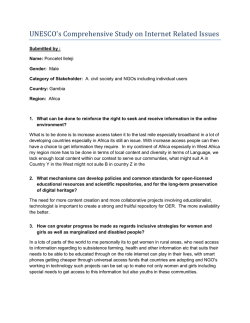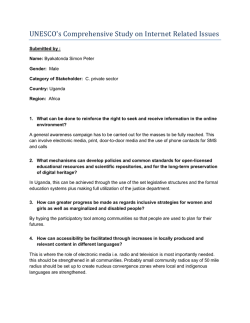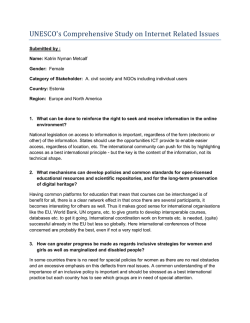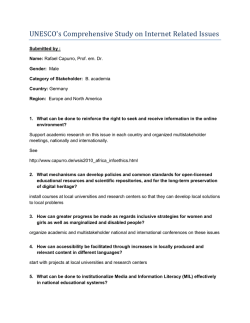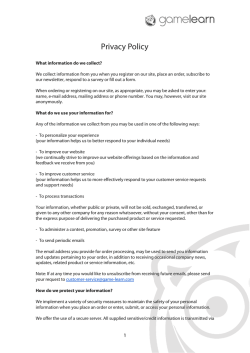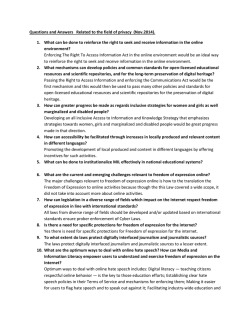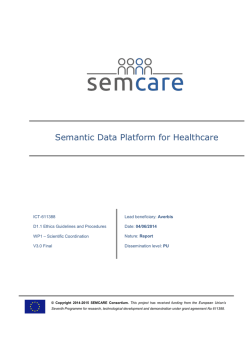
Toby Mendel
UNESCO's Comprehensive Study on Internet Related Issues Submitted by : Name: Toby Mendel Gender: Male Category of Stakeholder: A. civil society and NGOs including individual users Country: Canada Region: Europe and North America 1. What can be done to reinforce the right to seek and receive information in the online environment? This is an extremely complex question. As part of a general answer, I am attaching a report on the Internet and human rights published by CLD (with the cover removed to fit the 1MB limit; the report is also available at: http://www.law-democracy.org/wp-content/uploads/2010/07/finalInternet.pdf (and in Spanish at: http://www.law-democracy.org/live/wpcontent/uploads/2012/08/Report.Internet.CLD_.final_.Spa_.pdf). A simple answer to this question is perhaps by putting in place a legal and policy framework which respects freedom of expression online and then implementing that framework. http://unesco-ci.org/cmscore/sites/default/files/webform/internetissues/report.internet.cld_.final_.no_cover.docx 2. What mechanisms can develop policies and common standards for open-licensed educational resources and scientific repositories, and for the long-term preservation of digital heritage? There is a need for broad social discussions about all of these issues before specific policies, adapted to the needs and capacities of different countries, can be adopted. One emerging theme in many countries is the idea that publicly funded work cannot be copyrighted (or is subject to the open licences that progressive countries are now attaching to publicly copyrighted works). As far as preservation goes, policies are needed to address this, just as they are in the offline world. 3. How can greater progress be made as regards inclusive strategies for women and girls as well as marginalized and disabled people? Once again, this is a complex question and the answer depends at least in part on the local situation. Probably the best general answer to this is that specific attention needs to be given to these issues, and policies developed to ensure inclusiveness. And the power of the technologies themselves needs to be brought to bear on this issue, in particular to ensure that material is effectively accessible to disabled people. 4. How can accessibility be facilitated through increases in locally produced and relevant content in different languages? This is very important indeed, and is a theme that is addressed in the document uploaded before. Experience shows that when relevant content is available, the uptake of new technologies is far greater. Once again, the power of the technologies to address language barriers (including through automatic translation tools) needs to be brought to bear. 5. What can be done to institutionalize Media and Information Literacy (MIL) effectively in national educational systems? One thing is to avoid using acronyms like MIL that not everyone can understand :) Seriously, this needs to be built into curriculums just like other subjects, perhaps as part of the course on the national language. 6. What are the current and emerging challenges relevant to freedom of expression online? Again, please refer to the study uploaded previously. Some of the more serious challenges are attempts to impose unduly intrusive regulatory rules on the use of new information technologies (such as licensing websites). Another is the need to protect the privacy of users, which is key to their feeling comfortable to communicate online (and through digital technologies in general, including mobile phones). More also needs to be done to develop appropriate rules on liability online and mechanisms to address harmful content online without posing a threat to freedom of expression online. 7. How can legislation in a diverse range of fields which impacts on the Internet respect freedom of expression in line with international standards? Very complex issue. Basically, rules need to be adapted to reflect the special nature of the Internet. For example, as noted above, the rules on liability offline cannot simply be transferred to an online world, because those who facilitate dissemination of information via the Internet are not the same as traditional publishers. And the same is true of general regulatory rules, such as the rules designed for broadcasting or the print media sector, which cannot simply be applied to the online world. 8. Is there a need for specific protections for freedom of expression for the Internet? Not at a constitutional or international law level. Guarantees of freedom of expression under international law and in the vast majority of national constitutions are drafting in such a way as to already cover the Internet. International law protects freedom of expression "through any other media", which includes the Internet. The existing guarantees under international law are strong and have been interpreted extensively and, for the most part, in expansive ways. To open all of this up by trying to adopt a new guarantee would be singularly counterproductive. 9. To what extent do laws protect digitally interfaced journalism and journalistic sources? This depends on the country. In many European countries, and as interpreted by the European Court of Human Rights, the rules on protection of sources have been applied in a fairly robust way to the online world. However, this is less true in some other countries, and of course surveillance poses a serious threat to journalistic sources. 10. What are the optimum ways to deal with online hate speech? How can Media and Information Literacy empower users to understand and exercise freedom of expression on the Internet? I see these as two quite different and essentially unrelated questions because, while MIL can help reduce the harm of hate speech, it cannot fully address this. As for the first question, hate speech online should be criminal, in line with international law (specifically, Article 20(2) of the ICCPR) and should be addressed just as other criminal speech is addressed online, albeit with a need for some degree of prosecutorial sensitivity to the specific nature of this speech. Of course a problem here is that some countries, most notably the United States, are persistent outliers on this issue inasmuch as they refuse to ban hate speech, so that hate groups can always migrate their products to the United States where they will be protected. As for the second question, MIL is important to empower users in various ways. For example, effective use of the Internet to find information depends on having the requisite searching skills. 11. What are the optimum systems for independent self-regulation by journalistic actors and intermediaries in cyberspace? This is a challenging issue and I don't think an optimum system has yet been developed, so this is an area where more work is probably needed. It's hard enough to run self-regulatory systems in the relatively well-defined world of the traditional print or broadcast media, and this becomes quantumly more difficult in the online world. 12. What principles should ensure respect for the right to privacy? I believe there is a need for a fundamental rethink of our conceptions of privacy in the digital world. Basically, I think that traditional understandings of privacy are no longer effective. Eg there is a fundamental disconnect between the sharing of information that we all authorise to google and Facebook to be able to use their services and traditional notions of privacy. This makes it far more difficult to defend privacy when it really is important. 13. What is the relationship between privacy, anonymity and encryption? This is somewhat complex. Anonymity and encryption can help keep private communications private (or unidentified) but of course they do not define what is privacy. 14. What is the importance of transparency around limitations of privacy? Very important. Where privacy is limited, at least people should know about it. Probably one of the aspects of the Snowden allegations which most upset people was that these things were taking place without their knowledge. 15. What kinds of arrangements can help to safeguard the exercise of privacy in relation to other rights? Given that privacy is a right on its own merits, I think that it needs to be protected in a similar way regardless of whether or not this is related to other rights. And so all of the tools to protect privacy - legal, technological, etc. - come into play here. 16. How can openness and transparency of data be reconciled with privacy? The key to this is a public interest balancing, such as is commonly applied to conflicts between freedom of expression (and of the media) and privacy. There will always be conflicts between transparency and privacy, and when they arise, we need to use a public interest balancing to decide which interest will prevail in any given context or situation. 17. What may be the impact of issues relating to big data on respect for privacy? There is a vibrant debate about anonymisation of big data and the risk of this being breached by combining (mashing) datasets. However, the real potential for such breaches remains unclear and some of the most often cited studies on this are more about poor anonymisation practices than breaches which probed good anonymisation. There is, however, also the question of security of big data (and, theoretically, also any data). 18. How can security of personal data be enhanced? This seems to be mainly a technical issue which I am not qualified to answer. Of course there need to be clear rules and protocols around this, so that sufficient attention and resources are dedicated to it. 19. How can Media and Information Literacy be developed to assist individuals to protect their privacy? This is an important area of privacy protection, starting with young kids who are just beginning to use digital tools. Basically, kids need to understand that they lose control of information once they share it with others and that there is a difference between transient forms of information (talking) and recorded information, which may then be shared. 20. How can ethical principles based on international human rights advance accessibility, openness, and multi-stakeholder participation on the Internet? I am not sure it is correct to talk of ethical principles based on human rights. Human rights is a binding set of rules that applies to States, and which is different from ethics. I am also not sure it is correct to talk of ethics as advancing accessibility, openness and multi-stakeholder participation. These seem to me to be more policy and perhaps commercially driven issues. For example, advancing access to the Internet is not driven by ethics so much as a combination of technology, commerce and policy (regulatory) tools. 21. What conceptual frameworks or processes of inquiry could serve to analyse, assess, and thereby inform the choices that confront stakeholders in the new social uses and applications of information and knowledge? This is rather an abstract question and it is not clear what it is really getting at. 22. How does ethical consideration relate to gender dimensions of the Internet? I see this as being more closely related to ethics. For example, respect for others, including at a gender level, is important to ensure equitable access to and use of the Internet. Some of the most serious problems of bullying and abuse of digital tools to harm others arise from a lack of a proper ethical understanding of what is and what is not appropriate in the digital world. 23. How can ethics, - i.e. the simultaneous affirmation of human rights, peace, equity, and justice - inform law and regulation about the Internet? Once again, I simply do not understand ethics in this way (i.e. as being an affirmation of human rights, peace, etc). It is unethical to lie but this does not necessarily affect these other values. Furthermore, I see the subjects of law and regulation as not essentially being ethical questions (or as being superseded in their ethical dimension by the legal rule: it is wrong to kill but this is overridden somehow by the fact that it is also criminal). At the same time, human rights and the other values should certainly help inform law and regulation, as discussed in some of the responses above. 24. What international, regional and national frameworks, normative guidelines and accountability mechanisms exist of relevance to one or more fields of the study? Big question. I think the 2011 Joint Declaration by the specialised mandates on freedom of expression (attached and available at: http://www.law-democracy.org/live/joint-declaration-onaccess-to-the-internet/) remains one of the best statements of the implications of freedom of expression for regulation of the Internet. http://unesco-ci.org/cmscore/sites/default/files/webform/internetissues/mandates.decl_.2011.internet.doc 25. How do cross-jurisdictional issues operate with regard to freedom of expression and privacy? This is a very difficult issue for regulating online speech. The Joint Declaration attached above talked about a "real and substantial connection" before jurisdiction could be asserted in a State. But this remains a bit general and there is a need for more work on this issue. 26. What are the intersections between the fields of study: for example, between access and freedom of expression; ethics and privacy; privacy and freedom of expression; and between all four elements? Once again, a very complex question. There are a multitude of intersections. In many ways, these issues all support each other, as in the case of privacy and freedom of expression vis-avis surveillance, but of course in other cases there are conflicts between privacy and freedom of expression. 27. What pertinent information materials exist that cut across or which are relevant to the four fields of the study? There is an enormous literature on these issues! 28. What might be the options for role of UNESCO within the wider UN system in regard to the distinct issues of online Access to information and knowledge, Freedom of Expression, Privacy and Ethical dimensions of the information society? In my previous answers, I have identified a few areas where UNESCO could contribute. I think studying comparative approaches in many of these areas and putting forward better practice options could be quite an important UNESCO contribution. And also developing standards.Both of these could be promulgated within and without the UN system. It might be useful for UNESCO to coordinate with some other UN actors, such as UNDP, which impact directly on regulatory and technological systems as part of their development work in different countries - to ensure respect for minimum standards. 29. What might be options for the role of UNESCO in relation to stakeholders outside the UN system? UNESCO could provide technical assistance to States and Internet companies which were trying to put in place legal and policy frameworks for the Internet which respected international standards. As a cross-cutting issue between its freedom of expression and education mandates, UNESCO could develop model MIL curriculums for different levels of school. 30. For each study field, what specific options might UNESCO Member States consider? They should try to put in place and then implement legal and regulatory systems which respect and provide for an appropriate balancing of these rights.
© Copyright 2026
